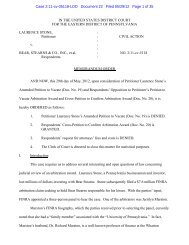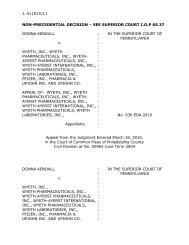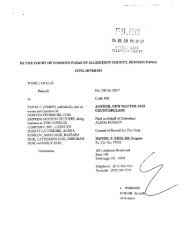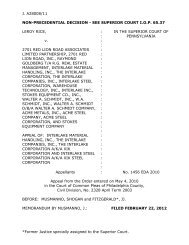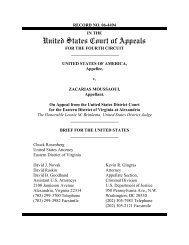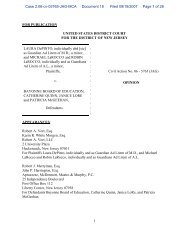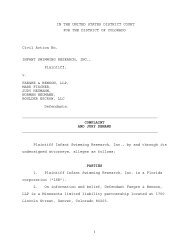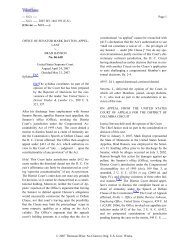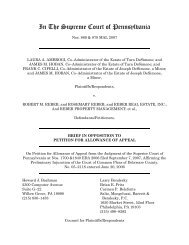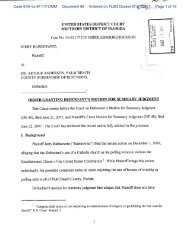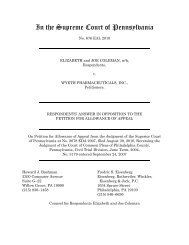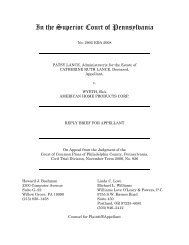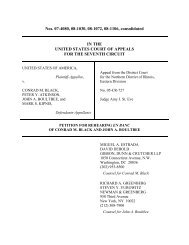Reply Brief for Appellant - How Appealing
Reply Brief for Appellant - How Appealing
Reply Brief for Appellant - How Appealing
You also want an ePaper? Increase the reach of your titles
YUMPU automatically turns print PDFs into web optimized ePapers that Google loves.
In the Supreme Court of Pennsylvania<br />
No. 16 MAP 2011<br />
MESIVTAH EITZ CHAIM OF BOBOV INC.,<br />
<strong>Appellant</strong>,<br />
v.<br />
PIKE COUNTY BOARD OF ASSESSMENT APPEALS,<br />
Appellee,<br />
DELAWARE VALLEY SCHOOL DISTRICT and<br />
DELAWARE TOWNSHIP,<br />
Intervenors.<br />
REPLY BRIEF FOR APPELLANT<br />
On Allowance of Appeal from the Judgment of the Commonwealth Court<br />
of Pennsylvania at No. 2343 C.D. 2008 filed December 29, 2009,<br />
Affirming the Judgment of the Court of Common Pleas of<br />
Pike County, Pennsylvania, No. 1095–1997 Civil,<br />
entered September 11, 2008<br />
<strong>How</strong>ard J. Bashman<br />
2300 Computer Avenue<br />
Suite G–22<br />
Willow Grove, PA 19090<br />
(215) 830–1458<br />
Counsel <strong>for</strong> <strong>Appellant</strong>
TABLE OF CONTENTS<br />
Page<br />
I. INTRODUCTION ............................................................................................... 1<br />
II. ARGUMENT IN REPLY .................................................................................... 4<br />
A Ruling In Favor Of Camp Mesivtah, Upholding Act 55’s<br />
Constitutionality, Would Not Threaten To Erode This Court’s Judicial<br />
Supremacy ........................................................................................................... 4<br />
III. CONCLUSION .................................................................................................. 11
Cases<br />
TABLE OF AUTHORITIES<br />
– ii –<br />
Page<br />
Arizona Christian School Tuition Org. v. Winn, 131 S. Ct. 1436 (2011) ..................... 9<br />
Donohugh’s Appeal (Donohugh v. Library Co. of Phila.), 86 Pa. 306 (1878) ........... 6, 7<br />
G.D.L. Plaza Corp. v. Council Rock School Dist.,<br />
515 Pa. 54, 526 A.2d 1173 (1987) ....................................................................... 3<br />
Hospital Utilization Project v. Commonwealth,<br />
507 Pa. 1, 487 A.2d 1306 (1985) ................................................. 1, 2, 4–8, 10, 11<br />
Walz v. Tax Comm’n of City of New York, 397 U.S. 664 (1970) ................................... 8<br />
Constitutions<br />
Pa. Const. art. VIII, §2................................................................................................... 8<br />
Statutes<br />
10 Pa. Stat. Ann. §371 ................................................................................................... 1<br />
10 Pa. Stat. Ann. §375 ................................................................................................... 9
I. INTRODUCTION<br />
The appellees and their amici offer this Court a stark choice: either uphold<br />
the doctrine of judicial supremacy and retain the meaning of the term “purely public<br />
charity” found in Pennsylvania’s Constitution as declared in Hospital Utilization<br />
Project v. Commonwealth, 507 Pa. 1, 21–22, 487 A.2d 1306, 1317 (1985), or<br />
relinquish a portion of this Court’s constitutionally assigned judicial power to the<br />
legislative branch, with the attendant risk of undermining the separation of powers<br />
that is a hallmark of Pennsylvania’s system of government.<br />
Fortunately, this case does not actually present the supposed horrific<br />
constitutional separation of powers crisis that appellees and their amici would have<br />
this Court believe. Regardless of whether this Court rules in favor of Camp<br />
Mesivtah or the local taxing authorities, this Court in this case will have the final<br />
say concerning what the term “purely public charity” should mean under<br />
Pennsylvania’s Constitution. Moreover, the General Assembly in enacting the<br />
Purely Public Charity Act, Act of November 26, 1997, P.L. 508, 10 Pa. Stat. Ann.<br />
§371, et seq. (“Act 55”), did not purport to overrule this Court’s decision in HUP.<br />
Rather, the legislature’s express and bona fide reasons <strong>for</strong> enacting Act 55 were to<br />
eliminate the uncertainty, lack of clarity, and conflicting judicial standards <strong>for</strong><br />
determining whether an organization qualifies as a “purely public charity” while<br />
retaining intact the five–prong test that this Court announced in the HUP case.<br />
None of the appellees or their amici seriously argues that, if the General<br />
Assembly had enacted Act 55 be<strong>for</strong>e this Court issued its decision in HUP, this
Court in HUP would have rejected the General Assembly’s definition of “purely<br />
public charity” as contrary to the meaning of that phrase as used in Pennsylvania’s<br />
Constitution. The argument that allowing a religiously themed summer camp to<br />
qualify as a purely public charity would violate either the Establishment Clause or<br />
the so–called separation of church and state is frivolous, because the government is<br />
not being asked to give Camp Mesivtah any money. Rather, Camp Mesivtah is<br />
merely being allowed to retain some portion of the limited funds that it has instead<br />
of being required to pay that money over to the taxing authorities.<br />
This case does not present either an affront or a threat to judicial supremacy.<br />
This Court will have the last word on what the phrase “purely public charity”<br />
means in Pennsylvania’s Constitution regardless of whether this Court sides with<br />
Camp Mesivtah or the local taxing authorities. The question presented asks<br />
whether the General Assembly’s understanding of how the phrase “purely public<br />
charity” as used in Pennsylvania’s Constitution should be defined might be<br />
preferable from this Court’s own perspective to the definition that this Court<br />
adopted in the HUP case in the absence of any legislative input.<br />
Appellees and their amici concede, as they must, that the General Assembly<br />
under Pennsylvania’s constitutional design is assigned the powers of taxing and<br />
spending, but they would have this Court conclude that only this Court may decide<br />
the intricate details <strong>for</strong> determining whether a tax exemption that the General<br />
Assembly is allowed to enact under Pennsylvania’s Constitution is or is not<br />
permissible. The absurdity of appellees’ position is that the test that this Court<br />
– 2 –
adopted in 1985 <strong>for</strong> deciding whether an organization “relieves the government of<br />
some of its burden” in order to qualify as a purely public charity must stand<br />
inviolate <strong>for</strong> all time, despite a constantly changing world in which the concept of<br />
governmental burden itself fails to remain static. Cf. G.D.L. Plaza Corp. v. Council<br />
Rock School Dist., 515 Pa. 54, 59–60, 526 A.2d 1173, 1175 (1987) (noting that “prior<br />
cases have limited value as precedent because of the continually changing nature of<br />
the concept of charity and the many variable circumstances of time, place, and<br />
purpose”) (internal quotations and citations omitted).<br />
In sum, Camp Mesivtah does not contend that this Court should defer to and<br />
adopt the General Assembly’s definition of “purely public charity” contained in Act<br />
55 as a means of ceding judicial power to the legislature. Rather, Camp Mesivtah is<br />
asking this Court to adopt the General Assembly’s definition of what criteria must<br />
be satisfied <strong>for</strong> an organization to constitute a “purely public charity” because the<br />
legislative criteria represent an improvement on this Court’s previously announced<br />
criteria, and because the legislative criteria themselves represent a lawful<br />
interpretation of what the words “purely public charity” as used in Pennsylvania’s<br />
Constitution should mean.<br />
In our common law system, courts retain the right to reexamine holdings,<br />
which may have seemed unquestionably correct when issued, based on intervening<br />
experience and continuing interaction between and among the various branches of<br />
government. This Court’s last word on the meaning of “purely public charity” in the<br />
context of this case should be to hold that the General Assembly’s definition of what<br />
– 3 –
constitutes “reliev[ing] the government of some of its burden” is both legally<br />
permissible and preferable to the test that this Court announced in HUP, and thus<br />
the General Assembly’s definition of “reliev[ing] the government of some of its<br />
burden” will replace the specifics <strong>for</strong> satisfying that prong in HUP as the standard<br />
that Pennsylvania’s Constitution compels.<br />
II. ARGUMENT IN REPLY<br />
A Ruling In Favor Of Camp Mesivtah, Upholding Act 55’s<br />
Constitutionality, Would Not Threaten To Erode This Court’s<br />
Judicial Supremacy<br />
The local taxing authorities and their amici in this case urge this Court to lay<br />
down the gauntlet and decree that once this Court has sought to define a term<br />
contained in Pennsylvania’s Constitution, the General Assembly is powerless to ask<br />
this Court to reconsider, even on an issue such as tax exemptions that is so closely<br />
related to the General Assembly’s core powers of taxing and spending. But just<br />
because this Court is entitled to have the last word on what Pennsylvania’s<br />
Constitution means does not necessitate a holding that this Court’s ruling from<br />
1985 in HUP must <strong>for</strong>ever operate to govern whether an organization may qualify<br />
as a “purely public charity.”<br />
No one would equate the phrase “purely public charity” with such majestic<br />
constitutional terms as “freedom of speech” and “due process,” and yet the meanings<br />
of “freedom of speech” and “due process” are constantly evolving and changing,<br />
based in part on actions that the legislative and executive branches have taken.<br />
– 4 –
Merely because the judicial branch is entitled to the last word on what<br />
constitutional terms such as “freedom of speech” and “due process” mean does not<br />
mandate that the legislative and executive branches can have no influence<br />
whatsoever on the judiciary’s understanding of those terms.<br />
Here, as all parties to this lawsuit have acknowledged, the General Assembly<br />
in 1997 enacted Act 55 to refine and improve on this Court’s standards announced<br />
in HUP <strong>for</strong> determining what organizations will qualify as purely public charities.<br />
In some relatively narrow respects, Act 55 may expand the availability of the<br />
“purely public charity” definition to organizations such as Camp Mesivtah, which<br />
might not satisfy every single detail of this Court’s HUP test originally announced<br />
in 1985.<br />
As Camp Mesivtah argued in its opening <strong>Brief</strong> <strong>for</strong> <strong>Appellant</strong>, there is nothing<br />
inherently unconstitutional about Act 55’s standards <strong>for</strong> determining whether an<br />
organization qualifies as a “purely public charity” under Pennsylvania’s<br />
Constitution. In other words, if the General Assembly had enacted Act 55 be<strong>for</strong>e<br />
this Court issued its ruling in HUP, there is no reason to suspect that this Court<br />
would have struck down as unconstitutional any aspect of Act 55’s criteria <strong>for</strong><br />
qualifying as a purely public charity.<br />
But, because the timing was in fact reversed, and this Court issued its ruling<br />
in HUP be<strong>for</strong>e the General Assembly enacted Act 55, the local taxing authorities in<br />
this case are maintaining that this Court must strike down Act 55 as<br />
unconstitutional to the extent that the General Assembly seeks to provide a tax<br />
– 5 –
exemption to any organization that would not qualify under the HUP test. To be<br />
sure, this Court certainly could opt <strong>for</strong> the confrontational approach to guarding its<br />
judicial powers that the taxing authorities prefer, whereby this Court would<br />
jealously protect its declared meaning of “purely public charities” against any actual<br />
or perceived encroachment from either of the other two branches.<br />
Camp Mesivtah respectfully submits that its proposed outcome represents a<br />
far more reasonable and mature approach toward deciding the issue presented<br />
herein. In passing Act 55, the General Assembly was seeking to improve on the<br />
certainty and clarity of the test <strong>for</strong> “purely public charity” that this Court<br />
announced in the HUP case. There is nothing inherently unconstitutional about the<br />
criteria <strong>for</strong> qualifying as a “purely public charity” under Act 55 other than that<br />
some organizations may qualify <strong>for</strong> a tax exemption under Act 55 that did not<br />
qualify under HUP. It is likewise conceivably possible that some organizations<br />
might have satisfied the HUP test that would not qualify <strong>for</strong> an exemption under<br />
Act 55.<br />
If this Court agrees with the General Assembly that Act 55’s test <strong>for</strong><br />
qualifying as a “purely public charity” is preferable to the HUP test, then this Court<br />
would still be having the final word on what “purely public charity” means under<br />
Pennsylvania’s Constitution, except that this Court would be adopting Act 55 in<br />
place of the HUP test. In Donohugh’s Appeal (Donohugh v. Library Co. of Phila.), 86<br />
Pa. 306 (1878), this Court affirmed a trial court ruling which recognized that the<br />
phrase “purely public charity” should be “construed in a liberal spirit.” 1878 WL<br />
– 6 –
13276, at *3. The trial court’s ruling in Donohugh’s Appeal, which this Court<br />
approved and affirmed, further noted that “[e]specially is great respect due to the<br />
legislative construction of a constitutional provision where, as in the present case, it<br />
is a question, not of private right, but of public policy.” Id. at *4.<br />
As the trial court recognized in Donohugh’s Appeal, in an opinion whose<br />
reasoning this Court upheld and endorsed, “<strong>for</strong> the preservation, as well as <strong>for</strong> the<br />
determination in the first instance, of matters of state policy, the proper tribunal is<br />
the legislature; and its construction of a constitutional mandate, upon this subject,<br />
must be held binding and conclusive unless shown clearly and beyond all question,<br />
to be in violation of the intention of the people in their sovereign expression of their<br />
will through the constitution.” Id. For the reasons previously explained at length in<br />
Camp Mesivtah’s opening <strong>Brief</strong> <strong>for</strong> <strong>Appellant</strong>, at least when it comes to deciding<br />
what it means <strong>for</strong> an organization to be “reliev[ing] the government of some of its<br />
burden” to satisfy that prong of the HUP test, the General Assembly is uniquely<br />
well–qualified to decide.<br />
The taxing authorities and their amici advance two feeble arguments <strong>for</strong> why<br />
this Court should refuse to replace the HUP test with Act 55. First, they<br />
hypothesize that allowing the General Assembly to decide who is entitled to tax<br />
exemptions could return Pennsylvania to the dark ages of the 1800s during which<br />
legislative abuses ran rampant. It is absurd to suggest that Act 55 represents such<br />
an abuse, and it is equally absurd to suggest that Pennsylvania’s General Assembly<br />
– 7 –
is trying to orchestrate any special tax exemption <strong>for</strong> the small Bobov Hasidic sect<br />
from Brooklyn, New York.<br />
In addition, even if the HUP test were to remain good law in all respects, the<br />
General Assembly has the power to decide that fewer than all who might qualify <strong>for</strong><br />
a tax exemption under Pennsylvania’s Constitution are in fact entitled to receive<br />
such tax exemptions. Thus, the very type of ancient abuses of tax exemptions that<br />
the taxing authorities and their amici are warning against could still be practiced<br />
under the current system, but those abuses thankfully simply no longer exist. In<br />
short, Act 55 does not represent a manifestation of the harm (tax exemption abuses)<br />
supposedly to be avoided, nor does that harm appear to have any current relevance<br />
in the context of this case.<br />
Second, the taxing authorities and their amici are wrong in suggesting that<br />
allowing a religious organization to obtain a real estate tax exemption would<br />
somehow violate the Establishment Clause. To begin with, the very tax exemption<br />
at issue in this case already expressly covers houses of worship. See Pa. Const. art.<br />
VIII, §2(a)(i) (allowing the General Assembly to exempt from taxation “[a]ctual<br />
places of regularly stated religious worship”). Surely that would constitute an<br />
Establishment Clause violation if anything would. Secondly, and even more<br />
importantly, in Walz v. Tax Comm’n of City of New York, 397 U.S. 664, 680 (1970),<br />
the U.S. Supreme Court held that a New York statute exempting from real estate<br />
tax land owned by associations organized exclusively <strong>for</strong> religious purposes and<br />
used exclusively <strong>for</strong> carrying out such purposes was not unconstitutional as an<br />
– 8 –
attempt to establish, sponsor, or support religion. See also Arizona Christian School<br />
Tuition Org. v. Winn, 131 S. Ct. 1436 (2011) (rejecting an Establishment Clause<br />
challenge to an Arizona statute that allowed a dollar–<strong>for</strong>–dollar offset from tax<br />
liability <strong>for</strong> monies donated as charitable contributions to fund religiously based<br />
schools).<br />
The taxing authorities make the misleadingly simplistic argument that the<br />
General Assembly could not have legitimately concluded that an organization that<br />
“[a]dvances or promotes religion” would “relieve the government of some of its<br />
burden” because the government has no burden to advance or promote religion.<br />
What the taxing authorities’ argument overlooks, however, is that the General<br />
Assembly legitimately could conclude, and apparently has concluded, that<br />
organizations which advance or promote religion do relieve the government of some<br />
of its burden by creating greater moral or social awareness among the citizenry, in<br />
addition to producing a more highly educated and law–abiding citizenry.<br />
Moreover, Camp Mesivtah’s argument is not merely that it satisfies Act 55’s<br />
specifications <strong>for</strong> relieving the government of some of its burden simply because<br />
Camp Mesivtah advances or promotes religion. Rather, as explained at pages 28<br />
and 29 of Camp Mesivtah’s <strong>Brief</strong> <strong>for</strong> <strong>Appellant</strong> filed April 21, 2011, that is but one<br />
of four legislatively specified grounds <strong>for</strong> “reliev[ing] the government of some of its<br />
burden” that Camp Mesivtah satisfies, see 10 Pa. Stat. Ann. §375(f)(2)–(5), and<br />
Camp Mesivtah need only satisfy one of those criteria to qualify as a “purely public<br />
charity” under Act 55, see id. at §375(f).<br />
– 9 –
Camp Mesivtah can of course appreciate why the local taxing authorities and<br />
their amici are asking this Court to take a most rigid and unreasonable approach to<br />
the separation of powers issue so that this Court would do nothing more than hold<br />
that any real estate tax exemption enacted by the General Assembly beyond that<br />
authorized under the HUP test must be rejected as unconstitutional. That is the<br />
only holding in this case that would allow the taxing authorities to prevail.<br />
Yet if there is any territory over which the judicial and legislative branches<br />
should wage a fierce battle over judicial supremacy in construing the language of<br />
Pennsylvania’s Constitution, surely this is not that case. All this Court needs to do<br />
here to hold that Camp Mesivtah qualifies as a purely public charity under the<br />
HUP test and Act 55 is to hold that the General Assembly’s definition of what<br />
constitutes “reliev[ing] the government of some of its burden” is entitled to judicial<br />
deference, both because the legislative branch is entitled to define in the first<br />
instance what organizations constitute “purely public charities” and because the<br />
legislature has a unique and unparalleled ability to decide what constitutes a<br />
government burden and relief thereof.<br />
In sum, this Court can vindicate its judicial authority at the same time that it<br />
upholds the General Assembly’s ef<strong>for</strong>t to assist in determining what organizations<br />
should qualify as “purely public charities” under Pennsylvania’s Constitution. All<br />
that this Court needs to do is hold that the General Assembly’s definition in Act 55<br />
of what organizations qualify as purely public charities is both reasonable and<br />
– 10 –
preferable as an improvement upon the approach that this Court detailed twelve<br />
years earlier in the HUP case.<br />
III. CONCLUSION<br />
For all of the reasons set <strong>for</strong>th above and in Camp Mesivtah’s opening <strong>Brief</strong><br />
<strong>for</strong> <strong>Appellant</strong>, this Court should hold Camp Mesivtah qualifies as a “purely public<br />
charity” under Pennsylvania’s Constitution because Camp Mesivtah satisfies Act<br />
55’s criteria <strong>for</strong> “reliev[ing] the government of some of its burden.”<br />
Dated: July 11, 2011<br />
– 11 –<br />
Respectfully submitted,<br />
<strong>How</strong>ard J. Bashman<br />
2300 Computer Avenue<br />
Suite G–22<br />
Willow Grove, PA 19090<br />
(215) 830–1458<br />
Counsel <strong>for</strong> <strong>Appellant</strong>
CERTIFICATE OF SERVICE<br />
I hereby certify that I am this day serving two true and correct copies of the<br />
<strong>for</strong>egoing document upon the persons and in the manner indicated below which<br />
service satisfies the requirements of Pa. R. App. P. 121:<br />
Service by First Class U.S. Mail addressed as follows:<br />
Stephanie E. DiVittore, Esquire<br />
Rhoads & Sinon, LLP<br />
Twelfth Floor<br />
One South Market Square<br />
P.O. Box 1146<br />
Harrisburg, PA 17108–1146<br />
(717) 233–5731<br />
Counsel <strong>for</strong> Delaware Valley School District<br />
Stacey Beecher, Esquire<br />
Beecher & Chelak<br />
106 West High Street<br />
Mil<strong>for</strong>d, PA 18337<br />
(570) 296–3700<br />
Counsel <strong>for</strong> Pike County Board of Assessment Appeals<br />
Anthony J. Magnotta, Esquire<br />
Ox<strong>for</strong>d Place Route 590<br />
P.O. Box 408<br />
Hawley, PA 18428–0408<br />
(570) 226–5700<br />
Counsel <strong>for</strong> Delaware Township<br />
Jonathan F. Bloom, Esquire<br />
Thomas W. Dymek, Esquire<br />
Karl S. Myers, Esquire<br />
Stradley, Ronon, Stevens & Young, LLP<br />
2600 One Commerce Square<br />
Philadelphia, PA 19103<br />
(215) 564–8000<br />
Counsel <strong>for</strong> amici curiae the Elected Leaders of<br />
the Senate of the Commonwealth of Pennsylvania
Dated: July 11, 2011<br />
David E. Loder, Esquire<br />
Philip H. Lebowitz, Esquire<br />
Melissa S. Snyder, Esquire<br />
Duane Morris LLP<br />
30 S. 17th Street<br />
Philadelphia, PA 19103<br />
(215) 979–1000<br />
Counsel <strong>for</strong> amicus curiae The Hospital &<br />
Healthsystem Association of Pennsylvania<br />
Stuart L. Knade, Esquire<br />
Chief Counsel<br />
Pennsylvania School Boards Association<br />
400 Bent Creek Boulevard<br />
P.O. Box 2042<br />
Mechanicsburg, PA 17055<br />
(717) 506–2450<br />
Counsel <strong>for</strong> amicus curiae Pennsylvania<br />
School Boards Association<br />
Robert L. Knupp, Esquire<br />
407 North Front Street<br />
P.O. Box 830<br />
Harrisburg, PA 17108–0830<br />
(717) 238–7151<br />
Co–counsel <strong>for</strong> amicus curiae the County<br />
Commissioners Association of Pennsylvania<br />
Anthony M. McBeth, Esquire<br />
407 North Front Street<br />
Harrisburg, PA 17101<br />
(717) 238–3686<br />
Co–counsel <strong>for</strong> amicus curiae the County<br />
Commissioners Association of Pennsylvania<br />
– 2 –<br />
<strong>How</strong>ard J. Bashman<br />
2300 Computer Avenue<br />
Suite G–22<br />
Willow Grove, PA 19090<br />
(215) 830–1458



